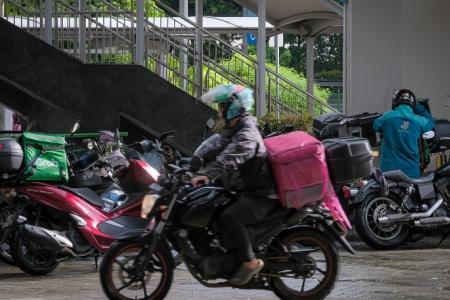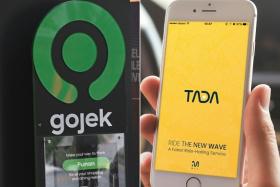Platform workers mixed on CPF contributions
In his eight years as a private-hire car driver, Mr Kelvin Lam, 49, has met with at least two accidents that put him out of action for a month or two.
In both cases, his lost income and medical bills were covered by personal accident insurance that he had been paying for, as part of a scheme by ride-hailing firm Grab to provide greater insurance protection beyond the basic free tier.
Having benefited from such coverage, Mr Lam welcomed the news that platform operators must provide more than 70,000 gig workers with work injury compensation insurance at the same level as that for employees, after the passage of a new law on Sept 10.
Other ride-hailing drivers and freelance delivery workers interviewed were unanimous in their support for the insurance regime that will kick in as part of the new Platform Workers Act from 2025.
But not everyone was enthused about contributing a greater portion of their earnings to the Central Provident Fund (CPF) savings scheme under the law.
Consumers were also divided over whether they would be prepared to pay more to defray the higher business costs that will arise from the new measures.
Under the Act, higher CPF contribution rates will be compulsory for younger platform workers born from Jan 1, 1995, and optional for older workers.
Private-hire driver Richard Ong, 42, said he will not opt for the higher contribution rates as he already has a flat and believes CPF savings are not as crucial for his retirement.
Even so, he is worried about the impact the new CPF scheme will have on his earnings, especially since platform operators will also have to fork out their share of the contributions, which will hit their bottom lines.
“I have been driving full-time for 7.5 years and our earnings are getting lower and lower... With the CPF scheme, it is going to get worse, which means longer hours,” Mr Ong said.
Food delivery rider Muhammad Irfan Zakkaria, 21, said mandatory CPF contributions are essential for those in his age group and will help him save for future needs, and ease his worries about paying for housing and healthcare.
Delivery rider Fakhrurrazi Kasim, 23, agreed, but felt that the higher contribution rates will be beneficial only to those working in the platform sector full-time.
Ride-hailing, delivery and logistics companies that are likely to be covered under the law said stronger labour protection for gig workers will lead to added business costs.
The Digital Platforms Industry Association (DPIA), which represents Grab, foodpanda and Deliveroo, said the new measures will add significant costs to the industry, though the scale of the financial impact remains uncertain as the cost of work injury insurance and the scale of CPF contributions are still unclear.
With the onus on platform operators to deduct CPF contributions from workers’ earnings and send them to the CPF Board, DPIA said its members have dedicated significant efforts over the past few years to develop systems and workflows to enable this.
- Additional reporting by Tay Hong Yi
Get The New Paper on your phone with the free TNP app. Download from the Apple App Store or Google Play Store now


